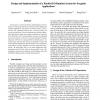Free Online Productivity Tools
i2Speak
i2Symbol
i2OCR
iTex2Img
iWeb2Print
iWeb2Shot
i2Type
iPdf2Split
iPdf2Merge
i2Bopomofo
i2Arabic
i2Style
i2Image
i2PDF
iLatex2Rtf
Sci2ools
126
click to vote
IPPS
1998
IEEE
1998
IEEE
Design and Implementation of a Parallel I/O Runtime System for Irregular Applications
In this paper we present the design, implementation and evaluation of a runtime system based on collective I/O techniques for irregular applications. We present two models, namely, "Collective I/O" and "Pipelined Collective I/O". In the first scheme, all processors participate in the I/O simultaneously, making scheduling of I/O requests simpler but creating a possibility of contention at the I/O nodes. In the second approach, processors are grouped into several groups, so that only one group performs I/O simultaneously, while the next group performs communication to rearrange data, and this entire process is pipelined to reduce I/O node contention dynamically. Both models have been optimized by using software caching, chunking and on-line compression mechanisms. We demonstrate that we can obtain significantly highperformance for I/O above what has been possible so far. The performance results are presented on an Intel Paragon and on the ASCI/Red teraflops machine a...
Collective I/o | Collective I/o Techniques | Distributed And Parallel Computing | I/o Node | IPPS 1998 |
Related Content
| Added | 05 Aug 2010 |
| Updated | 05 Aug 2010 |
| Type | Conference |
| Year | 1998 |
| Where | IPPS |
| Authors | Jaechun No, Sung-Soon Park, Jesús Carretero, Alok N. Choudhary, Pang Chen |
Comments (0)

